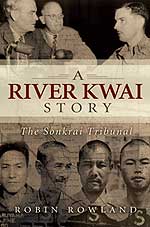The title is now
A River Kwai Story
F Force and the Sonkrai Tribunal
Labels: Burma Thailand Railway, Guantanamo, human rights, Japan, publishing, Singapore, World War II, writing
My CBC colleague Paul Gorbould of our online Archives reveals one of the secrets that Google is using to create its controversial Google Book Search, by turning high-end Nikons into a robotic scanner.
It's from a company called Kirtas, and has a total cost of about $200,000.
Details on his blog in a post called Speed Reader.
Reminds of the old sayings about using a racehorse to pull a cart.
But at least using the Nikon will likely ensure the result is readable!
As the New Yorker reported this week Google wants to scan every book ever published and this has been controversial ever since it was announced. Legal expert Jeffrey Toobin says in the story Google isn't the only outfit planning to scan every written word from Gilgamesh to Harry Potter.
Gilgamesh, at least in the original cuneiform, if you can find a copy that is not copyrighted by a museum, should have been in pubic domain for 4600 years. Harry Potter, of course, will remain copyrighted for years after the latest Harry Potter and the Deathly Hallows hits the streets in July.
And Google recently announced plans to merge Google Maps with Google Books, so, in theory, you can follow your character, fiction or non-fiction, through the streets of New York or Moscow. Although I wonder how Google Book-Maps would handle the settlements in Robert Heinlein's Moon is a Harsh Mistress
(Wikipedia entry)
I now have a "what do I have to lose" attitude about Google Book Search, especially since Toobin's article shows that the publishers are of two minds (or perhaps forked tongues) on the issue, at one end making deals with Google and on the other suing over copyright issues.
Ever since book publishing became part of media conglomerates and began selling books to the major chains, rather than the reading public, the author has become the least important person in the process. I simply assume--and most writers I know agree with this--that I am going to be ripped off anyway. So what's a little copyright infringement along the way? Perhaps if Google finds a way to pay the author's share directly for those who want to view or download copyright works, rather than going through the publishers, there will be more pluses than minuses for an author.
It's often less frustrating and more satisfying just to blog at least part of your work without having to deal with magazines that won't pay you enough for your time and effort any way or editors who write "guidelines" which are so unclear that they could have used a good copy editor. That's why I am blogging how I am building my model railway, rather than bothering to go to the magazines, which demand all rights --another ripoff.
Labels: CBC, Google, Google Book Search, Harry Potter, photography, publishing, Robert Heinlein, writing




